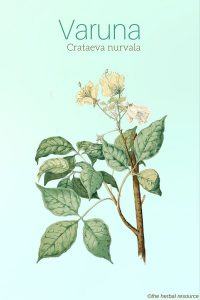The key constituents of crataeva nurvala are alkaloids; triterpenes; tannins; saponins; flavonoids; plant sterols; and glucosilinates.
The main health actions of crataeva nurvala are diuretic, antilithiatic, rubefacient (reddening the skin by producing hyperemia) and anti-inflammatory.
The bark of varuna is believed to have antioxidant, contraceptive, anti-inflammatory, antimicrobial, and urinary-renal supportive qualities, the root is laxative and lithinotriptic and the leaves are believed to be stomachic and tonic.
Crataeva nurvala is one of the best litholytic herbs (ability to break up stones).
Scientific research has indicated that a constituent of varuna, lupeol, deactivates the enzyme glycolate oxidase, reducing the body’s production of oxalates which combine with calcium to form kidney stones.
Additionally, varuna is used as a natural diuretic as it also could hinder kidney stones formation.
Crataeva nurvala is an important Ayurvedic herb that is especially valued for its effectiveness in the treatment of renal conditions.
Varuna is used by traditional Ayurvedic herbalists to increase appetite while stimulating digestion and elimination and also as an herbal treatment for flatulence and abdominal pain.
Varuna is also discussed in the ancient Vedic literature as an important herb for use as a blood purifier.
The bark of the varuna is believed to be especially effective when used to treat infections of the urinary tract.
Crataeva nurvala is believed to relieve difficulty in urination caused by enlarged prostate and it has been used traditionally as a natural herbal treatment in urinary calculi, dysuria (painful urination) and cystitis.
Varuna is often used topically to dilate superficial capillaries and stimulate circulation and scientific research has demonstrated that varuna may support the cardiovascular system by maintaining the suppleness and openness of the arteries.
Taken internally, varuna is used to reduce fever and a decoction made from varuna leaves has also been used as a natural remedy for fever and associated delirium.
Crataeva nurvala is used as a cholegogue (promotes the discharge of bile from the system), anthelmintic (expels worms) and anti-amoebic in both intestinal and hepatic infestations.
Varuna is considered to be a useful herb for anorexia, tumors and liver disorders and externally, varuna is used as a poultice for the treatment of cervical adenitis, abscess, enlarged spleen, rheumatic joint pain, and edematous wounds.
The fresh juice of leaves of varuna is commonly used as a bitter tonic.

Leave a Reply